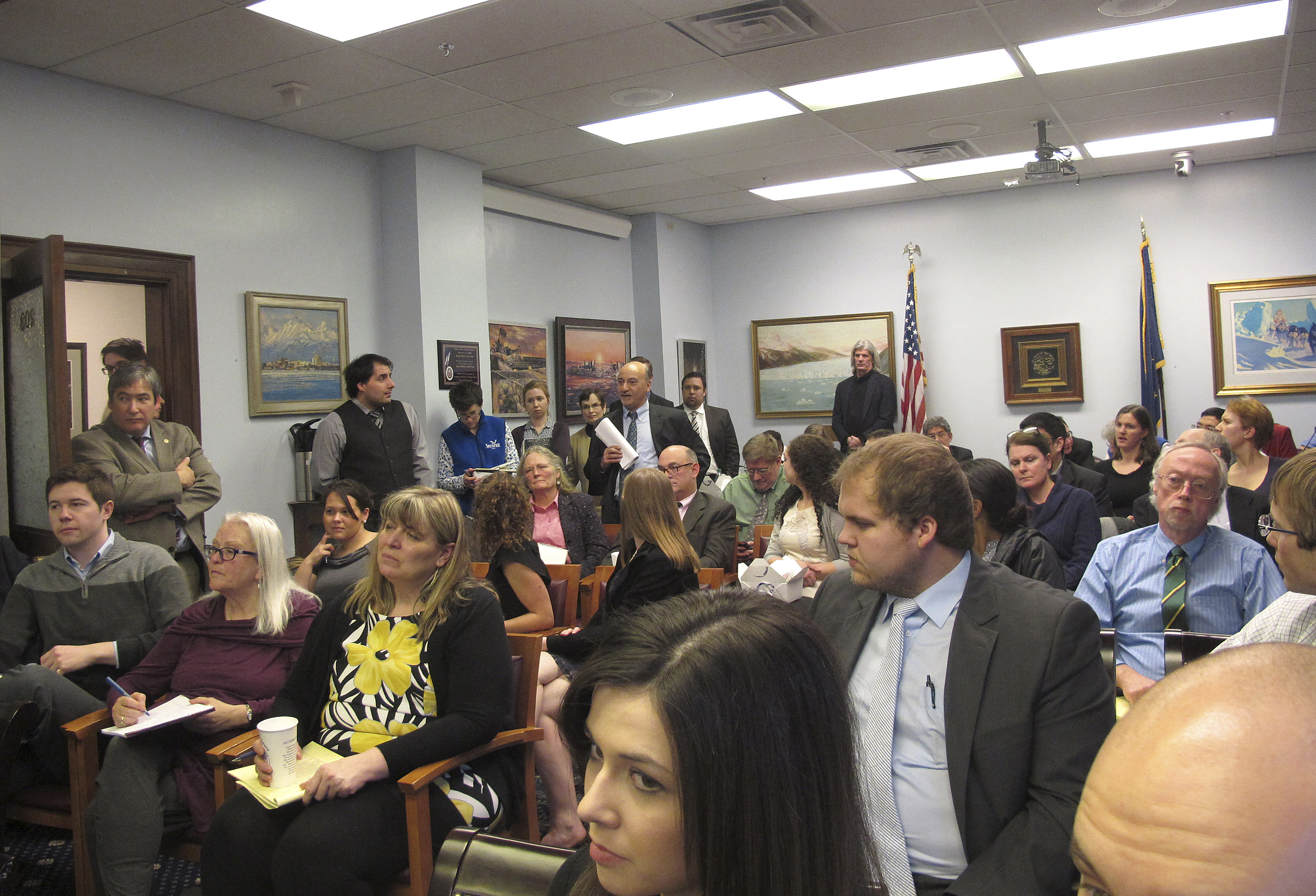JUNEAU, Alaska — The smell of mayo and murmur of voices filled the air as the committee rooms reserved at the state Capitol for an informational gathering on Medicaid expansion filled to standing room only with legislators, aides and others.
Many in attendance plucked from the back free boxed lunches of sandwiches and chips provided by Americans for Prosperity-Alaska, which opposes expansion and put on the event. The public TV crew that broadcasts hearings and other legislative goings-on was there.
The presentation earlier this month focused on pitfalls other states have experienced with Medicaid expansion. The interaction with audience members who support expansion, including legislators and Alaska’s health commissioner, was at times spirited.
But the event wasn’t all that unusual. It’s called a Lunch and Learn, an opportunity for those interested to hear about an array of topics, some related to legislation, others not, in a casual setting. Topics this year have included drones, the economics of mining, quality teaching in Alaska and salmon. Videos of the events are archived at the public affairs channel. In a one-month span, there were at least 16 Lunch and Learns. Two have been held on one day.
Supporters of Lunch and Learns say the events, which are open to the public, allow legislators and others to use the lunch hour during the busy 90-day session to learn about a topic or get up to speed on issues they might not hear in their committees. But two key questions have arisen: At what point does education become advocacy? And how do you regulate what constitutes a legislative purpose so an event can be held in a Capitol room?
Now, the offices in the House and Senate that set the rules for each chamber have asked for guidance from the Select Committee on Legislative Ethics on parameters for Lunch and Learns.
Glenn Wright, an assistant professor of government at the University of Alaska Southeast, said it’s difficult to draw a line between conventional lobbying or advocacy and education because much of what a good lobbyist does is provide information. He includes in that category paid lobbyists, ordinary citizens and legislators coming from a certain perspective.
“We in Alaska and in the United States have never been very successful at creating rules that limit the influence of lobbying. But we’ve been very good at creating rules that have silly unintended consequences that may make it more difficult for legislators to do their jobs,” said Wright, who has attended Lunch and Learns. “That’s not to say rules couldn’t be written or maybe shouldn’t be written. But it’s really hard to do.”
Jerry Anderson, administrator of the legislature’s Select Committee on Legislative Ethics, said that what’s advocacy to one person might be education to another. “And I think that’s what they struggle with with those Lunch and Learns,” he said.
There are no written guidelines that legislators can cite for Lunch and Learns. It’s understood, however, that legislators sponsoring Lunch and Learns must secure use of a room. The House and Senate Rules offices must sign off if event flyers are posted on Capitol bulletin boards, and the offices can ask questions to get a feel for what is proposed. The offices also look to see that there is a legislative sponsor. Registered lobbying groups, other organizations or lawmakers can buy the food.
When legislative resources are used, there has to be a legislative purpose and there cannot be a private benefit, Anderson said. But the ethics law doesn’t define legislative purpose.
Rep. Craig Johnson, R-Anchorage, and chair of the House Rules Committee, said he started Lunch and Learns while on the House Resources Committee to provide education on generic natural resource-related topics. Over the years, he said, they have proliferated and veered toward advocacy.
Jeremy Price, state director for Americans for Prosperity-Alaska, said the speaker at last week’s Medicaid expansion Lunch and Learn, a senior fellow with a group that has referred to the dangers of expansion, is an expert on Medicaid issues. Because groups supporting expansion have lobbyists in Juneau, Price said he saw it as an opportunity to discuss the other side of the issue. Americans for Prosperity-Alaska, part of a national organization backed by the conservative billionaire Koch brothers, is not registered as a lobbying group.
Rep. Geran Tarr helped sponsor an emotional Lunch and Learn in which an adult survivor of child sexual abuse spoke in support of legislation she and others have introduced that would require schools provide age-appropriate sexual abuse education. Tarr, D-Anchorage, said that while her position on a bill or issue might be known, those in attendance might just be learning about the topic. It’s important to have a dialogue, factual information and a chance for questions, she said.
Sarah Erkmann, with the Alaska Oil and Gas Association, said Lunch and Learns are an informal, efficient way to educate people on topics of interest, such as responding to oil spills, a subject of one association-sponsored event this session. Erkmann’s group usually sponsors two or three a year, at a cost of about $10 a person for boxed-lunch meals, she said. Because she and the association’s president and CEO are registered lobbyists, the meals are reported in the association’s disclosure reports, Erkmann said.

